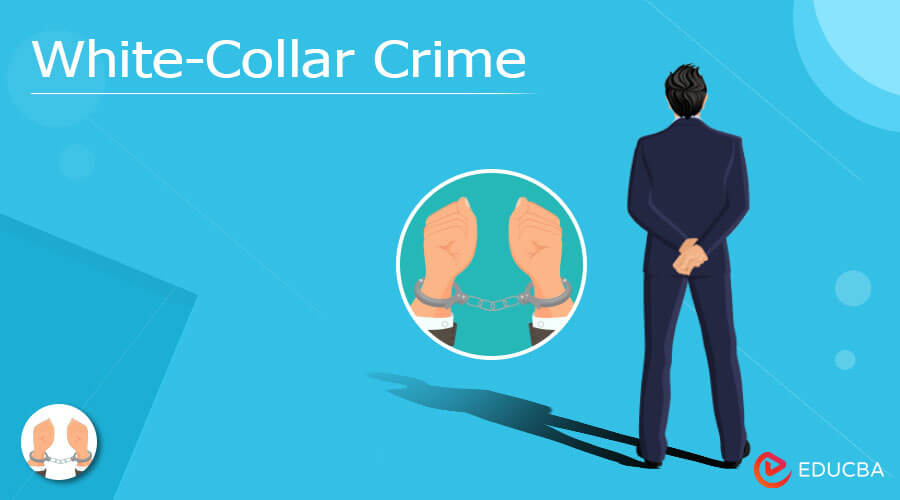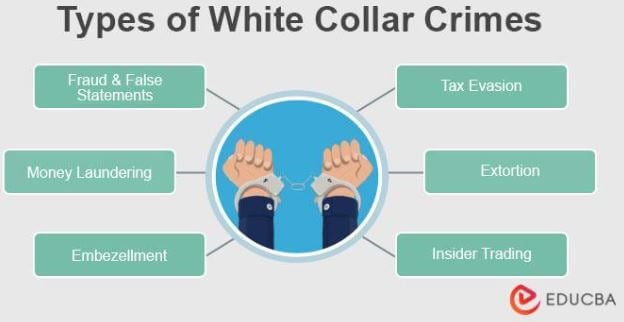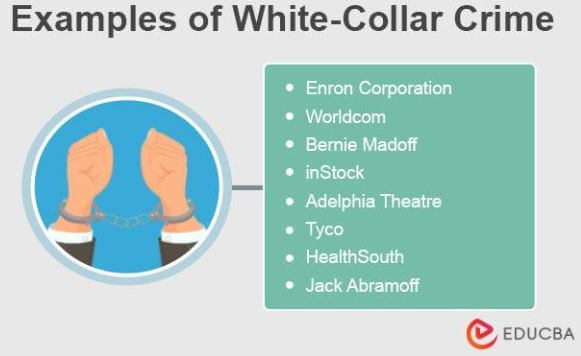Definition of White-Collar Crime
White-collar crime is a specific type of criminal activity involving nonviolent offenses that typically have financial motivations. Unlike other forms of criminal activity, there is no physical force or threat to others in committing a white-collar crime. White-collar crimes include money laundering, fraud, tax evasion, and insider trading.
While it does not typically involve violence, it can devastate victims, businesses, and the economy. Typically people with white-collar jobs commit such crimes. Thus it is called white-collar crime. These are people who work in office settings and have professional positions. Usually, victims may not even know they are victims of such crimes. They may know only months or years later when the law identifies the perpetrator.
Key Takeaways
- White-collar crime is a crime that business and government professionals commit. The aim is to make money through nonviolence.
- Common types of white-collar crime include fraud, embezzlement, and money laundering.
- While they are not violent, they can still have devastating effects on the victims and the economy. For example, Bernie Madoff’s Ponzi scheme cost his investors over $65 billion.
- One study estimates that around 5% of Americans commit at least one type of white-collar crime in their lifetime.
Classification & Types of White-Collar Crime
White-Collar crime has two classifications; individuals or corporations can commit these crimes. Both stem from the same reason, to make a financial gain. There are four main types of white-collar crime: fraud, corruption, money laundering, and cybercrime. These crimes are typically nonviolent, and the perpetrators do not use weapons. While these crimes may not involve violence, they can still have devastating effects on victims.
1. Regulatory Offences
These crimes involve breaking the rules and regulations set out by laws or companies you owe responsibility. For example, consider someone illegally downloading music on their laptop when they have unlimited access to it on their smartphone. The owner can charge for copyright infringement even though there was no malicious intent behind the action.
2. Ponzi Schemes
Ponzi schemes are investment frauds that involve promising investors high returns with little to no risk. Charles Ponzi became famous for using the scheme in the early 1920s and thus the name. Essentially, a Ponzi scheme is a fraudulent investment that pays existing investors with money from new investors rather than from profits earned. This type of scheme typically collapses when there is not enough new money coming in to sustain it.
3. Money Laundering
Money laundering is how black money is converted into white. They move money through a series of banks or businesses to make it untraceable to the source. Money laundering is a federal crime and can result in up to 20 years in prison.
4. Information Theft
One of the most common types of white-collar crime is information theft. It can involve anything from stealing sensitive company information to identity theft. Information theft can be committed in various ways, including hacking computer systems, searching trash cans, or even bribing employees.
5. Tax Evasion
Many people don’t realize they are guilty of a white-collar crime when they don’t file taxes or try to avoid paying them. One can commit this crime by simply not reporting all of their income or taking unfair advantage of deductions.
Causes of White-Collar Crime
The causes of white-collar crime vary on the individual and the specific context in which the crime occurs. Some common causes of white-collar crime include greed, power, and opportunity. White-collar criminals may sometimes feel they are above the law or won’t get caught.
Financial pressure or personal problems may also lead some people to commit white-collar crimes. Finally, a person’s environment (e.g., their family) may also affect their likelihood of committing a white-collar crime. For example, if a child sees their father cheat at work, they might not know what is right and wrong. It might seem like something everyone does.
How to Identify a White-Collar Crime?
People wearing suits and ties commit some of the most damaging and costly crimes. They may be less visible than traditional street crimes because highly educated professionals generally execute them in offices or boardrooms. Sometimes these crimes go undetected for years before law enforcement can catch up. Here are some warnings firms and individuals should look for in different white-collar crimes.
- Unexpected large transactions to parties at unusual hours or days can indicate fraud.
- Unfamiliar documentation, signatures, or missing original files can also be a sign.
- A sudden change in employees’ behavior, evident financial or personal issues, and work frustration can guide them to commit such crimes.
- It can be an unknown record on your credit report or an unexpected change in credit scores. One might even receive debt collection notices.
- Keep checking your insurance offers to ensure no one is taking advantage of your benefits.
- A mail or message about credential change which you do not recognize can also be a warning.
You can do a few things to protect yourself from becoming a victim of white-collar crime.
- Be aware of the types of scams. Employ a compliance officer.
- Do your research before giving anyone your personal information or money. Don’t be afraid to ask questions or for help if you’re not sure about something.
- Ask an expert in your field and trust their advice. Expert Walter Paulo suggests hiring a white-collar crime-convicted felon.
- Install safety software for your digital devices and security cameras at your workplace and residence.
- Companies can carry out employee screenings before and again weeks after the hiring process.
- Make the company regulations more effective. Companies should train employees in managerial positions to identify fraudulent activities.
White-Collar Crime – Punishments
The convict can face any number of punishments, including fines, restitution, probation, and imprisonment. The specific penalties will depend on the offense’s severity and criminal history. The culprit may be able to avoid jail time by cooperating with investigators or entering into a plea agreement. However, with an extensive criminal record or if the crime is particularly severe, the judge may sentence them to prison time.
When it comes to sentencing guidelines for white-collar crimes, there are no hard and fast rules. Depending on the circumstances of the case, a court might order that they pay restitution in addition to other penalties like probation and community service hours. The Federal Sentencing Guidelines recommend a longer prison sentence if even one victim suffers significant financial harm.
Real-World Examples
- “The King of Swindlers,” Victor Lustig
Born in the Czech Republic in 1890, he devoted his life to making money from the bad life from an early age. He sold the Eiffel Tower twice and deceived Al Capone, from whom he borrowed $50,000 for business purposes. If he didn’t pay him, Al Capone threatened to kill him. Lustig returned the money two months later but without the promised extra. He had deposited them in a bank to earn interest.
- Punjab National Bank fraud of 2017
In 2017, the Central Bureau of Investigation (CBI) uncovered a Rs 13,000 crore fraud at the state-run Punjab National Bank (PNB). The scam was perpetrated by two junior bank officials issuing Letters of Undertaking (LoUs) to companies linked to diamantaire Nirav Modi. A bank guarantees another bank that they will pay the amount on the specified date in the form of Letters of Undertaking.
- Bernie Madoff’s Ponzi scheme
Bernie Madoff’s Ponzi scheme was a fraudulent investment operation that promised investors huge returns on their investments but instead used the money to pay off earlier investors and fund Madoff’s lavish lifestyle. When the scheme collapsed, many people lost their life savings. Madoff was given a 150-year prison sentence, and his long-time secretary, Annette Bongiorno, received ten years. Bernard L. Madoff Investment Securities LLC has been closed since 2008.
Conclusion
White-collar crime is committed by people usually in positions of power and authority, and they use their knowledge and position to commit crimes. Some people do it for the thrill and money and because they think they will get away with it. People should be aware of the types of fraudulent scams to stay safe from white-collar crime. One should not give out personal information like social security numbers or bank account numbers to anyone unknown or untrustworthy. Always research financial offers, which might be scams.
Frequently Asked Questions (FAQs)
Q1. What is white-collar crime? Who coined the term white-collar crime?
White-collar crime is when someone commits a crime for financial benefit. It is usually a nonviolent crime. Edwin Sutherland, a sociologist from the United States, coined the term in 1939.
Q2. What are the white-collar crime types/classifications? What is the most common white-collar crime?
Individuals or corporations commit white-collar crimes. White-collar crimes include fraud, embezzlement, insider trading, money laundering, and more. The most common white-collar crime is tax evasion, when someone illegally avoids paying taxes.
Q3. Why do white-collar crimes go unreported? How to report a white-collar crime?
The victim may feel embarrassed or ashamed or may not want to draw attention to their own business dealings. Sometimes the victims are not even aware that a crime has been committed. One can file a complaint at the local police station or write it online to the FBI to report the crime.
Q4. Who are the victims of white-collar crime? How do white-collar crimes affect society/economy?
White-collar crime victims are typically individuals or businesses who suffer financial loss due to the crime. It can include everything from identity theft to fraud and embezzlement. In addition to the direct financial loss, white-collar crime also affects society and the economy. For example, fraud can lead to higher prices for goods and services. Additionally, tax evasion costs the government each year’s revenue.
Q5. What is the punishment for white-collar crime?
The punishment depends on the severity of the offense and the jurisdiction of the commitment of the crime. However, common punishments for white-collar crimes include fines, restitution, community service, and prison sentences. Offenders may also be required to forfeit their ill-gotten gains.
Recommended Articles
This has been a guide to white-collar crime. To learn more, visit the following articles.




